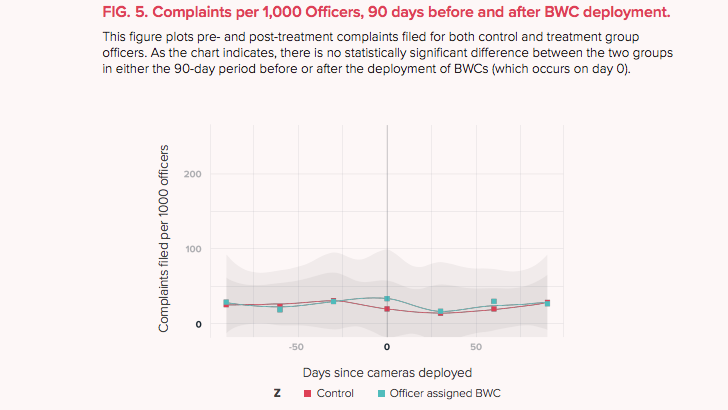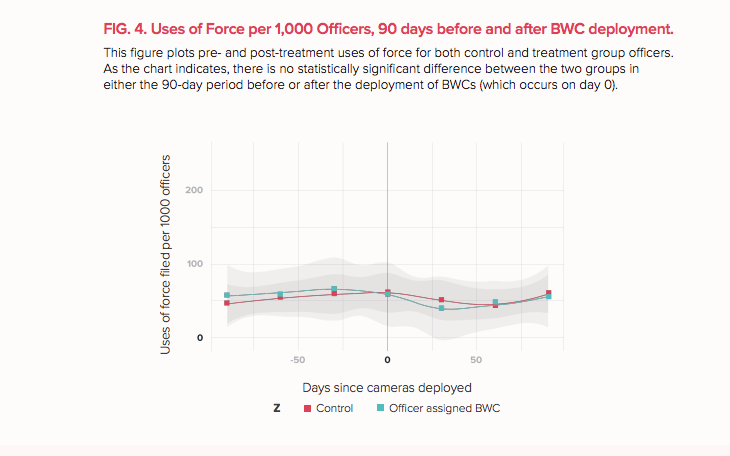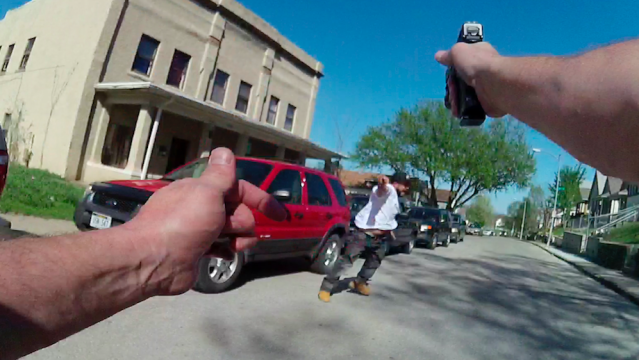A landmark new study following officers in the US capital has found no evidence that body cameras reduce allegations of police misconduct or officer use of force. More than 2000 officers participated in the study, making it the largest of its kind in the United States. Tracked over several months, Metropolitan Police Department (MPD) officers with body cameras received roughly the same number of civilian complaints as those without them and reported using force just about as often.
A still from body camera footage showing a police shooting in San Diego. (Image: AP)
Ultimately, the study by Washington, DC’s The Lab concluded that police departments “should not expect dramatic reductions in use of force or complaints, or other large-scale shifts in police behaviour, solely from the deployment of this technology”.
According to the working paper released today, 2224 officers participated in the randomised controlled trial. Of those, 1035 did not have cameras (the control group) while 1189 did (the treatment group). Officers were observed during the three months before and three months after body cameras were implemented in DC.
The Lab’s conclusion: body-worn cameras had no effect on either use-of-force or police misconduct complaints.
Police Misconduct Complaints

Image Source: “Evaluating the Effects of Police Body-Worn Cameras“/ The Lab DC
Researchers found no “statistically significant” difference between civilian complaints against cops with cams and those without them. Similarly, there was no difference between complaints filed in the three months before the cams were implemented and the three months after. The Lab tracked all complaints filed, whether they were ultimately dismissed or sustained by the MPD.
In the discussion section of the paper, the researchers admit that MPD officers have unique training, as they’re assigned to the nation’s capital, and face elevated scrutiny. In any case, there was no observable impact.
Use-of-Force

Image Source: “Evaluating the Effects of Police Body-Worn Cameras“/ The Lab DC
The MPD defines use of force as “any use of force resulting in injury or a complaint of injury or pain where the injury or pain is directly associated with a member’s use of force.” That can include takedowns, tackles, use of batons and stun guns, and of course, guns. Officers given cameras reported using these techniques just as frequently as they had without them.
Officers without cameras used the techniques as much as their counterparts and, as with civilian complaints, researchers didn’t observe an impact from the cameras.
Limitations and The Importance of Policy
Though this is the largest body camera study, it isn’t the first. Researchers have evaluated their effectiveness in Florida, California and the UK.
Results varied. A staggering 93 per cent drop in complaints was found in one trial and a 15 per cent increase in violence against officers wearing cameras was observed in another.
The Lab’s researchers note that the high visibility of being an officer in the nation’s capital may affect officer behaviour. As does the size. MPD has 3800 officers. Most in the US have fewer than 10.
The Lab’s results may not match those of every department, but “recalibrating” the expectations for body cameras to “induce large-scale behavioural changes in policing”. as the researchers suggest, will be invaluable as they become more widespread. And the technology powering body cameras is outpacing the law.
Though as many as one-third of police departments in the US use body cameras, the policies governing them are scattershot. Policies differ on when officers should record, when departments should release footage and whether cops can view their own footage before making a statement.
Community activists and law enforcement officials have lauded body cameras as a crucial part of police reform. These findings complicate that. Body cameras also introduce new privacy hurdles for communities, financial and administrative hurdles for police agencies, and accountability hurdles for them both. There won’t be an easy fix, but strong policies that demand police transparency are a critical first step.
